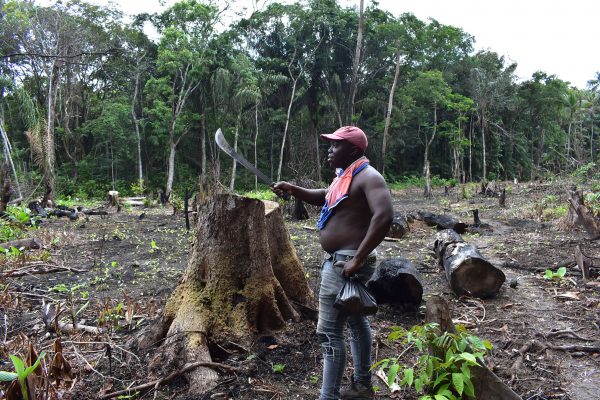Raise the issue of transforming agriculture in Region Ten into a viable and profitable pursuit and you are likely to trigger a surfeit of differing opinions from the relative handful of Linden’s farmers on just why a community that sits either on or relatively close to huge expanses of arable land has been unable to realise anything even close to self-sufficiency in farm products more than a quarter of a century after the decline of bauxite removed from it the sobriquet of ‘the mining town’.
The views on Linden’s failure, up until now, to deliver a thriving agricultural sector vary though the unchanging reality is that each week, vehicles roll into Linden from other agricultural communities offering produce at competitive prices whilst many of the farmers in the township fret over their own inability to be competitive.
The Stabroek Business’ visit to Linden a few weeks ago was undertaken specifically for the purpose of trying to secure an enhanced understanding of just why farming has not, over so many years, made at least a meaningful long-term contribution to providing greater numbers of income-generating options to bauxite mining. We found, frankly, that there are farmers at Linden, perhaps not in numbers that match other Administrative Regions of the country, but who appear every inch as committed as their counterparts in the more bountiful parts of the country. Still, it refuses to ‘come together’ for them.

We opted to use the day spent in Linden to engage a handful of its farmers, to try to secure as broad a perspective as possible of the challenges confronting the agricultural sector in the community and their prognosis for some measure of improvement in the period ahead.
We spoke first with Philbert Bowling, a West Watooka farmer who has been ‘in the business’ for the past fifteen years. His farm is located in an area of West Watooka known as Farmers’ Quarters. Bowling cultivates a wide variety of cash crops, opting to vend his produce just outside the Linden Hospital rather than trouble himself to take his produce to the more competitive environment of the municipal market.
On the issue of Linden’s prospects for self-sufficiency in agricultural goods, Bowling is an optimist. Beyond feeding itself, he believes that Linden can be a net exporter to other regions, the community’s biggest natural advantage reposing in the large expanses of uncultivated lands at its disposal including those in both the Demerara and Berbice Rivers. Perhaps the critical downside, he suggests, is that over time, Linden has not had to embrace agriculture as the sole option or even the major one for creating jobs and building an economy as has been the case in other communities across Guyana. The reality, these days, is starkly different.
As Bowling sees it, the retarded growth of Linden’s agricultural sector is a function, largely, of the limited funding available for significant investment in agriculture. He alludes to what many farmers in Linden say are the difficulties associated with securing the support of commercial banks and other lending agencies. Apart from the startup capital to which few if any farmers would have access from their limited savings, investors in agriculture, need funding to sustain them through their initial stages. The reality, he says, is that it is at that stage that many agricultural initiatives in the community either stand or fall.
Bowling believes too, that there have been instances of both inexperience and indiscipline that have resulted either in the reckless misdirecting of funds intended for agriculture, or else, ill-advised and ultimately poor investment decisions. The latter, he believes, may be a function of the weakness of the state-run agricultural support services in the community and the relatively limited access to the technical support services that would be available in the more high-profile farming communities across the country.
What the complainants in Linden are inclined to overlook, a commercial bank official told Stabroek Business, is the fact that as a community, Linden has been unable to make a sufficiently strong case to completely win over the lending sector to its agricultural pursuits. “The fact is that the banks will probably be more eager to channel lending into agriculture in Linden only if there are much stronger indications of success in farming there. At the moment it does not seem that the banking sector as a whole is entirely convinced.”
Bowling does not appear to disagree. He says that the success of agriculture in Linden will depend on the extent to which more support services for the sector are made available to the community, services like higher levels of technical expertise such as might be more readily available in other communities as well as expert investment advice that both advises on investment and upgrading initiatives as well as on the disbursement of funds made available by the lending sector for investment in agriculture in order to ensure that the recipients of those funds make the correct spending decisions.
According to Bowling, the common challenges confronting farmers in the West Watooka area means that their undertakings are all proceeding on a relatively modest scale with constraints and inefficiencies rendering cost of production sufficiently high to make it difficult for what they produce to compare with the farm produce imported into Linden.
The issue of trucks laden with a range of produce arriving in ‘the mining town’ every week to sell their produce in a community with a significant but unrealised agricultural potential of its own has long been a sore point in Linden. In the years since the bauxite industry has had to drastically reduce the number of Lindeners employed in the sector, the issue has come into even sharper focus though the question as to why the community has failed to turn around its inability to do more to feed itself remains unanswered.
Forty years after his first farming venture Lincoln Oseton, too, is of the view that that the agricultural sector in Linden has not made nearly enough meaningful strides, its continual growth stunted mostly by the loss of the income-earning option which the bauxite industry had provided for so many years. As a small West Watooka farmer, Oseton too prefers to take on the formidable challenge of retailing his produce, his experience of wholesalers, he says, having left him mistrustful of their proclivity for always seeking to control prices. As for the likelihood of Linden ever blossoming into a thriving agricultural community Oseton holds the view that if that is to happen a great deal has to change. He holds the view that farming is “a calling,” and that perhaps, the prolonged history of bauxite as the township’s main employer may well have suppressed such farming instincts that Lindeners might at one time have had. When we met him last weekend, he appeared preoccupied with the immediate-term prospects for farm prices arising out of the change of weather and the ‘breathing space’ that this would provide for the farmers who have grown used to protracted periods of unrewarding effort.
Crop protection is one of Oseton’s primary concerns. West Watooka farmers, he says, often suffer considerable losses as a result of the foraging of wild animals with deer, agouti and monkeys having taken a particular liking to farm produce. Without firearms, the farmers are defenseless and Oseton says that he has learnt to co-exist with the ‘thieves,’ simply replanting after they have gorged themselves.
Like Bowling, Oseton broods over the hold which the ‘importers’ of food crops have on the Linden market. The circumstance, he says, is likely to persist until the community steps up its game, raising the levels of efficiency in the agricultural sector and challenging effectively for control of its own market.
At 28, Rayon Lewis belongs to a younger generation of Linden farmers though the business ‘instinct’ in him causes him to see agriculture as a potentially lucrative prospect for an investor in Linden. His mother runs a butcher’s stall in the Linden Market and up until April he had been rearing pigs in Amelia’s Ward. Rayon is currently preoccupied with transferring his pig-rearing business to the West Watooka Farmers Quarters. There was a time too when he reared and sold chickens. Currently in possession of several acres of family land – of which about seven acres have been cleared for cultivation – he is in the process of formulating a plan for the cultivation of a range of cash crops. Rayon is insistent that the prospects for Linden becoming a centre for agricultural production are outstanding though access to financing for infrastructure and potentially lucrative markets up to this time are hurdles which he says, must be overcome.
Finally, we met Solomon, a vendor, whose place of business is at Potaro Road in Linden. Solomon is adamant that there is a potentially profitable market for locally cultivated agricultural produce in Linden but says that he is hard-pressed to find a farmer in the region who can guarantee him regular and adequate supplies of farm produce for his own ‘local’ market. Accordingly, Solomon says that he has had to acquire his supplies in Georgetown. He insists that the volumes of his purchases of okra, bora, calalloo, carila, papaya, eschallot and cabbage would provide a lucrative business for farmers in his own community.
Derek Collins, the Agricultural Officer assigned to the Region speaks hopefully about initiatives designed to boost the teaching of agricultural science in schools. Up until now modest numbers of schoolchildren in Linden are beginning to experience Agricultural Science as part of the curriculum. Whether this is likely to translate into careers as farmers is as yet unclear.
The continued ‘importation’ of agricultural commodities from outside the community remains an affront to the small pockets of farmers who pursue their livelihoods diligently in spite of all the stumbling blocks. Still, other Lindeners say that the community’s heart is not in farming. The problem is that up until now they appear not to have found any other significant employment options.










